R.M. Strong's Blog, page 5
October 18, 2012
Peeps at Many Lands: Ancient Egypt
I have to stay, I like old books. I used to like the smell of old books, the heavier stock used in old books, and the feel of the heavier covers. I don’t get that with the Kindle, so I’m left loving old books for the sheer love of old books. I love that Amazon has a team of volunteers that is currently converting many of the old public-domain books into free Kindle editions.
“Peeps at Many lands: Ancient Egypt” by the Rev. James Baikie (first published in London in 1916) is one such book. I am currently researching for a historical fiction novel set in New Kingdom Egypt and while old books (this one actually precedes the discovery of King Tutankhamen’s tomb) may not be the best for accurate interpretations of history, it was enjoyable nonetheless.
The Rev. Baikie writes his sometimes-fanciful and sometimes-erroneous (though not for the time) book as a conversation to his target audience–early 20th century school-aged English boys, boys who have grown up reading the exploits of Sir Henry Morton Stanley on his adventure to find Doctor Livingstone. Although he had never been to Egypt himself–instead relying on first-hand accounts of friends and colleagues who had gone–he describes Unchanging Egypt in the same way one can easily do today thanks to Google Earth:
It is a monotonous land–a long ribbon of green running through a great waste of yellow desert and barren hills.
In order to help his young readers accurately picture the significance of what he is writing of, he does a lot of comparing Ancient Egypt and Ancient (or even modern) England. He asks his readers to imagine, for instance, what it would be like if one found evidence of King Arthur’s court and then goes on to describe, “Well, in Egypt, you can see just that sort of thing.” When describing the young Egyptians’ day at school, he compares it to English grammar school. Some of these analogies don’t translate as well to a modern audience than it probably did nearly 100 years ago, but one gets the gist just as well.
Being a minister in the Church of Scotland, and then the United Free Church, the Rev. Baikie is very quick to point out that the Egyptians believed some strange, queer, funny, ridiculous, *insert age-appropriate adjective here* things when discussing the Egyptian pantheon and their ideas of “heaven” and “hell.” Instances of this are scattered throughout the book. As a Christian myself, I personally found this refreshing. Though if one is not, however, it may be a bit more annoying.
Because definitions of words change throughout the years, many terms and phrases that once seemed innocuous are now not nearly so. As with any older book, there are unintentionally-hilarious statements. The “best” is this:
The Egyptians were good marchers, and even in the hot Syrian sunshine, and across a rough country where roads were almost unknown, they could keep up a steady fifteen miles a day for a week on end without being fagged out.
I do, however, have to take issue with one assumption the Rev. Baikie makes: Namely, that Egypt would not hold the public’s attention or create the same sense of nostalgia (and, one can infer by extension, its own branch of archaeology) if it wasn’t for its role in the Bible–namely, the being the backdrop for the stories of Joseph, Moses, and the Plagues. I recognize that this book was written six years before Howard Carter’s discovery of “wonderful things,” but when a civilization has lasted twice as long as our modern civilization, whether it’s mentioned in the Bible or not, it’s going to garner attention.
All in all, I enjoyed to book… even though I am not the target audience by gender, age, and about 100 years. As a history text, The Rev. Baikie’s interpretations of archaeology have stood up well against the test of time. He did not mention–whether because he didn’t believe it or because it was not necessarily appropriate for his intended readers–the contemporary theory that “Tahuti” (his fictional every-day Egyptian boy) would have been encouraged to marry “Sen-Senb” (Tahuti’s younger sister). The Rev. Baikie’s timeline puts the time of the Exodus during the reign of Merenptah, making Moses’ adopted grandfather Ramesses the Great.
First two sentences:
“If we were asked to name the most interesting country in the world, I suppose that most people would say Palestine–not because there is anything very wonderful in the land itself, but because of all the great things that have happened there and above all because of its having been the home of our Lord. But after Palestine, i think that Egypt would come next.”


October 4, 2012
Currently Reading
I have not had an Amazon Kindle for long. Really, only about six months or so. Our hand-me-down Kindle 2 recently had an unfortunate run-in with a foot and we had to decide whether to go back to paper books or get a new one. We decided to upgrade to a Kindle touch. When I was re-categorizing everything, I realized that I have a rather eclectic and varied set of books. I have everything from cookbooks to science books to biographies to independent authors to books on how to live a Christian lifestyle and on how to write well and publish independently.
Stephen King once said that to be a good author, one must be an avid reader. so, I decided to start this blog to share my thoughts on the books with which I fill my Kindle. I do not yet know how often I will be able to post reviews, but when I finish a book, I now have a place to call my own to write my thoughts.
These are the books that are in my “Currently Reading” collection:
Barefoot Church: Serving the Least in a Consumer Culture by Brandon Hatmaker (HarperCollins Publishing)
Harry Potter and the Goblet of Fire by J.K. Rowling (
Frankenstien by Mary Wollstonecraft Shelly
The Space Empire Saga by Mary C. Findley (Independently Published)
Write Good or Die by Scott Nicholson, et. al. (Independently Published)


September 11, 2012
The Things That Bring Us Together
 Few events are seared into our memory, and bring the country together—not as Democrat and Republican, not as Black and White, but as Americans; as human beings. And it’s amazing how your age determines how you remember things.
Few events are seared into our memory, and bring the country together—not as Democrat and Republican, not as Black and White, but as Americans; as human beings. And it’s amazing how your age determines how you remember things. In my parents’ generation, the event that shocked the nation was President Kennedy’s assassination. Few other events—from the end of the Vietnam war, to Mt. Saint Helens’ eruption—held the same sway. My mother—three years old at the time—remembers the day Kennedy was shot. She remembers my grandmother crying and wondering why “Mickey Mouse Club” was not on that afternoon.
Fortunately as a nation, events like this come once, maybe twice, in a generation. I remember three national events quite vividly.
In kindergarten, both of the classes were rushed to the library to see a space shuttle lift off. This was no ordinary space shuttle mission, though. There was a teacher on board—the first civilian to go into space. She had been picked from all the applicants (including one from my now-home state of Idaho). This was history and our teachers wanted us to watch it. We sat on the orange carpet of the elementary school library and gazed up at the seemingly-huge TV screen. I can’t remember what we did before liftoff—goofed off, probably. But I do remember that all of us kindergarteners cheered when the fireworks were set off in honor of the astronauts going into space. We didn’t realize that the shuttle wasn’t supposed to explode, nor did we understand when our teachers started crying, and rushed us back to our classrooms, and continued the day in a somber mood. I didn’t understand why my father wouldn’t let me fly my plastic Challenger Space Shuttle kite anymore—it’s still tucked away in its box somewhere.
The second event I remember vividly was the start of the Persian Gulf War. It was January, I was in sixth grade, and had stayed after school to practice for a school musical. My mother picked me up after practice, and she had tears in her eyes. Mom was raised Quaker, and had registered as a Conscientious Objector, as had one of my uncles. My other uncle saw the Navy as a way to get an education and see the world, and was serving on an air craft carrier, the USS Abraham Lincoln. When I asked her what the problem was, and why she was crying, she told me that a war had been started, and she was afraid for her brother. For the next two months, we watched missiles hit--or try and hit--Israel, watched men in their brown fatigues, and prayed that my uncle’s ship would not be sent over. He was, but only after the war was over and sanctions had been in place for months.
I also remember where I was as I watched the Twin Towers fall—as does everyone else. I was in college, engaged, and living with my grandparents. My mother called and woke me up at 6:30 a.m.—entirely too early for a college student—and told me to turn on the TV. I did seconds after the second plane hit, alerted my grandparents, and called my fiancé. We all watched as the Towers burned, as people had to choose between jumping out windows and burning alive. We watched as the first Tower fell. I knew in my gut the other was going as well. My aunts all called the family home to check in. Everyone walked around in a daze that Tuesday, and the national anger began a few days later. I learned the next day that some good friends of mine had been sightseeing in the Twin Towers just mere hours before the planes hit.
Few things shape our conscience as national tragedies. As we observe the anniversaries and build memorials for ourselves and our children, we also need to tell our children how important events such as these were. The Challenger explosion and the Persian Gulf War may not be in your top three, but you have others that have shaped who you are. Our children will have their own. Today's middle schoolers on down do not remember the Twin Towers falling—all they see are pictures in history books and the file footage on the news on anniversaries. But they will have the same reactions as we have to their own tragedies.Now, I have to answer my son's questions every 11th of September on what the pictures mean. I still have my copy of The Oregonian from the 12th, and one day we will read it together. It’s our job as parents and as teachers to help our children understand the ramifications of events such as these and to let our children know it’s okay to be angry—we all were after the attacks in New York and Washington—or sad, as we were in 1986. These events show us who we are as Americans, and who we are as humans.
Origninally published on LocalSchoolDirectory.com
August 29, 2012
The Week That Was
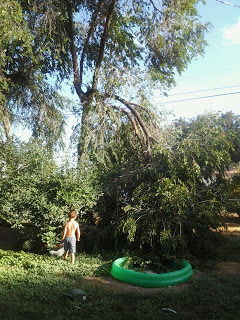
MONDAY
I woke Monday morning and went outside to let the chickens out of their coop to find this:
A very large tree branch on a very old elm tree had decided to commit suicide and fell down... kind of. It was still supported by the half of a branch below it and, well, the ground. (For scale, my son in the photo is 46" tall.) The chickens were very confused and immediately ran out, climbed into the leafy mess, and began scratching at it to try and clean it up.
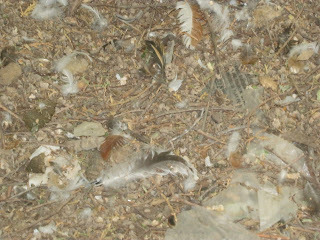
TUESDAYTuesday I went out to check on the girls before wrangling three boys into leaving for a doctor's appointment when I stopped breathing. Feathers were everywhere and there was a black (and very smug looking) dachshund in the back yard. It took me over an hour to find all of the girls. By the time I found everyone I was hyperventilating. Needless to say, I didn't get to the doctor that day.
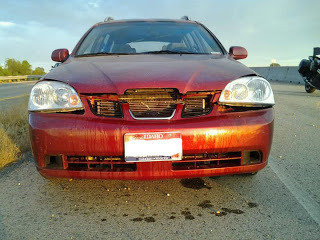 WEDNESDAYI got the call no wife ever wants to get from husband's best friend and carpool partner... the one that starts: "Don't worry. Everyone's okay, but...."
WEDNESDAYI got the call no wife ever wants to get from husband's best friend and carpool partner... the one that starts: "Don't worry. Everyone's okay, but...."Except our only vehicle was not okay. Both my husband and his best friend missed out on half a day of work, and we didn't have a car for the next two weeks.
After the first three days of the week, I was seriously contemplating not going to the fair on Thursday. (We went, and I got sunburned, but not too badly.) Friday and Saturday were actually enjoyable.
But--despite my ramblings and rantings on Facebook that week--I could (and can) see God's hand of protection in each one of these instances. In fact, it was the only thing that helped me even leave the house on Thursday and Friday. Each one of these instances could have been so much worse.
Monday: Look back at the picture. See the silvery line up in the top right hand corner? That's the power line coming to the house from the alley. It's our house's umbilical cord. The branch that came down was only inches from that power line in life. In its death, it completely missed the line altogether. Five weeks later,
Tuesday: Other than losing some feathers, none of my chickens were hurt. They could have easily all been killed because neither I nor the dog heard their cries of terror. According to the record in the feathers, Aki the Cockerel--who was supposed to be a girl but ended up not being one--fought off the dog while the girls ran for cover. In my panicked, frantic searching, I found him sitting on top of them in a back corner of the coop quietly whispering comforts to the terrified girls. (I love my Aki.)
Wednesday: Obviously, the big thing is that everyone was okay and both cars were repairable. Not only that, but the repairs were only about 75% of the estimate sent to the insurance company. We called to ask about the remaining money and they said it would be okay for us to keep it, which helped us cover 80% of our deductible.
So, that week will always be known as "The Week That Was." It's one to remember, not only because of what happened, but what could have easily happened instead.
But let all who take refuge in you be glad; let them ever sing for joy. Spread your protection over them, that those who love your name may rejoice in you. (Psalm 5:11 NIV)
August 7, 2012
Finding Hope Book Launch – Free Books and More!
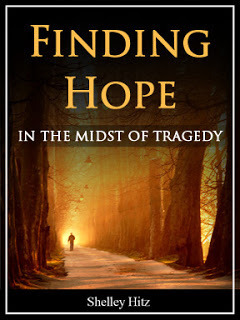
 Don’t miss out on this free Christian inspirational book! FREE on Wednesday 8/8/12 and Thursday 8/9/12 "Finding Hope in the Midst of Tragedy" by Shelley Hitz.
Don’t miss out on this free Christian inspirational book! FREE on Wednesday 8/8/12 and Thursday 8/9/12 "Finding Hope in the Midst of Tragedy" by Shelley Hitz. Get your copy here: http://www.bodyandsoulpublishing.com/
hope-for-the-hurting-christian-books-for-difficult-times/
Not only will you be able to download Shelley’s book for free, but also three other Christian books during her special book launch.
About the Book “Finding Hope in the Midst of Tragedy”
Have you been through difficult times in your life? If so, you are not alone. Jesus says in John 16:33, "In this world you will have trouble. But take heart! I have overcome the world." Notice that He doesn't say that we might have trouble or that if we have enough faith we will escape it. He clearly states that on this side of heaven we will walk through difficult times in our lives.
And yet we have reason to hope.
This book is Shelley’s own personal journey to finding hope after a tragedy hit her family. However, she did not want this book to be her story alone. Instead, she wants it to be a resource for you to find hope in the midst of your own difficulties. That is why she has added the sections that you will see through the book called, "From My Life to Yours," where she includes journaling prompts and reflection questions for you to apply what you are learning to your life. Her prayer is that God leads you to find His hope no matter what you are currently walking through.
"May the God of hope fill you with all joy and peace as you trust in him, so that you may overflow with hope by the power of the Holy Spirit." Romans 15:13
What Reviewers are Saying:
"A must read for anyone who has had storms in their life. I laughed, cried and got so excited. This book gave me the answers to many of my prayers and showed me the right way to forgive." - TALoveRocks
"This is a book of hope, trust, faith, forgiveness, and so much more! Highly Recommended!" - Sandra McLeod Humphrey
"Wow! My eyes are full of tears and my heart is full of God's promises to the author and to each of us. Great book!" - Kristie
Download your free copy and let your friends know about this special offer here on 8/8/12 and 8/9/12: http://
www.bodyandsoulpublishing.com/hope-fo...
Shelley Hitz is the author of the book, “Finding Hope in the Midst of Tragedy” which you can download for FREE on 8/8/12 and 8/9/12 here: http://
www.bodyandsoulpublishing.com/hope.
Shelley’s main passion is to share God’s truth and the freedom in Christ she has found with others. She does this through her books, websites and speaking engagements. You can find more about Shelley at www.ShelleyHitz.com or invite her to speak at your event here: www.ChristianSpeakers.tv
July 29, 2012
Staci Stallings "Learning To...."
Learning to...
I'm going to ask you a very simple question that is going to get you into a lot of turmoil.
If you never have to do something, how do you learn to do it?
Let's say that I am going to operate on you. Let's say further that you need a heart transplant. Now, the good news is that I've read a lot about doing heart transplants. I know the Anatomy book backwards and forward. I've looked at all the diagrams and all of the graphs and charts. So I'm pretty sure I can do this.
How confident are you in my ability to perform this task correctly on you?
(I see those nerves springing to the surface.)
But I don't see why you would be nervous. After all, I have read all about the history of the heart transplant, and I've even read up on the most recent advancements.
Why are you nervous?
I'll tell you why... because I've never actually done a heart transplant, right?
In fact, truth be known, I'm really squeamish at the sight of blood and would probably pass out the second the incision was being made! And in all honesty, I would not in good conscience even think I could do such a thing. It takes years of practice to be able to even consider doing such a thing.But the truth is we do this type of thing all the time in the spiritual realm. In fact, we get indignant when a practice-session comes our way.
After all, we've read in the Bible that we're supposed to forgive. 7 X 70 times. But what happens when our neighbor borrows our wrench and forgets to return it? Or when such-and-such said something about us, and we heard it?
See, much like that heart surgeon who doesn't just read about heart transplants and thinks he or she just knows how to do them, we have to be presented with opportunities to test if we can forgive. We need that knowledge to move from our heads to our hearts and through our hearts into our experience and our world. Until we do that, we are as helpful as a surgeon who has read all the books.
And how do surgeon's practice? Most of the time, they assist under a more skilled doctor for many years. That's why they do internships and residencies before becoming doctors because they need to have the book knowledge move through them into their actual experiences!
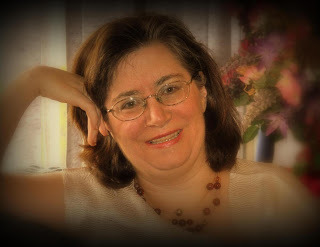 So when Jack shows up, and he broke your mower blade... again. Or Suzy made that comment, or Jill is mad, or Stan said...
So when Jack shows up, and he broke your mower blade... again. Or Suzy made that comment, or Jill is mad, or Stan said...Remember, this is how you learn to forgive and to love.
God's not mean for letting these people be in your life. He's helping you to learn to be the person who doesn't just read the words but lives them.
Staci Stallings, the author of this article, is a Contemporary Christian author and the founder of Grace & Faith Author Connection. You can check out one of Staci's Best-Selling Christian Romances...
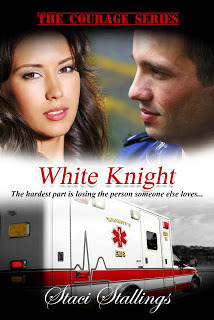 White Knight
White Knight~ The Courage Series~
Book 2 "Expect the unexpected..."
"Through a series of entertaining twists and turns and a lot of suspense, two very unlikely people find in each other a reason to laugh and love and live." --Amazon Reviewer, Myrna BrormanThe hardest part is losing the person someone else loves...
Buy your copy today for:Kindle Ebook: White Knight: Book 2, The Courage Series
 B&N Nook: http://ow.ly/ckyMh
B&N Nook: http://ow.ly/ckyMhCopyright Staci Stallings, 2012
Guest Post: Staci Stallings "Learning To...."
Learning to...
I'm going to ask you a very simple question that is going to get you into a lot of turmoil.
If you never have to do something, how do you learn to do it?
Let's say that I am going to operate on you. Let's say further that you need a heart transplant. Now, the good news is that I've read a lot about doing heart transplants. I know the Anatomy book backwards and forward. I've looked at all the diagrams and all of the graphs and charts. So I'm pretty sure I can do this.
How confident are you in my ability to perform this task correctly on you?
(I see those nerves springing to the surface.)
But I don't see why you would be nervous. After all, I have read all about the history of the heart transplant, and I've even read up on the most recent advancements.
Why are you nervous?
I'll tell you why... because I've never actually done a heart transplant, right?
In fact, truth be known, I'm really squeamish at the sight of blood and would probably pass out the second the incision was being made! And in all honesty, I would not in good conscience even think I could do such a thing. It takes years of practice to be able to even consider doing such a thing.But the truth is we do this type of thing all the time in the spiritual realm. In fact, we get indignant when a practice-session comes our way.
After all, we've read in the Bible that we're supposed to forgive. 7 X 70 times. But what happens when our neighbor borrows our wrench and forgets to return it? Or when such-and-such said something about us, and we heard it?
See, much like that heart surgeon who doesn't just read about heart transplants and thinks he or she just knows how to do them, we have to be presented with opportunities to test if we can forgive. We need that knowledge to move from our heads to our hearts and through our hearts into our experience and our world. Until we do that, we are as helpful as a surgeon who has read all the books.
And how do surgeon's practice? Most of the time, they assist under a more skilled doctor for many years. That's why they do internships and residencies before becoming doctors because they need to have the book knowledge move through them into their actual experiences!
 So when Jack shows up, and he broke your mower blade... again. Or Suzy made that comment, or Jill is mad, or Stan said...
So when Jack shows up, and he broke your mower blade... again. Or Suzy made that comment, or Jill is mad, or Stan said...Remember, this is how you learn to forgive and to love.
God's not mean for letting these people be in your life. He's helping you to learn to be the person who doesn't just read the words but lives them.
Staci Stallings, the author of this article, is a Contemporary Christian author and the founder of Grace & Faith Author Connection. You can check out one of Staci's Best-Selling Christian Romances...
 White Knight
White Knight~ The Courage Series~
Book 2 "Expect the unexpected..."
"Through a series of entertaining twists and turns and a lot of suspense, two very unlikely people find in each other a reason to laugh and love and live." --Amazon Reviewer, Myrna BrormanThe hardest part is losing the person someone else loves...
Buy your copy today for:Kindle Ebook: http://ow.ly/ckyuqB&N Nook: http://ow.ly/ckyMh
Copyright Staci Stallings, 2012
July 26, 2012
Why We Watch
 I gotta say, I'm a sucker for the Olympics (less than 24 hours to go! Notice the London phone boxes in honor of the Games). The pageantry, the memorable moments, the sportsmanship. It's not just about seeing Michael Phelps kick butt in 2008 (though, with a sick toddler that summer, I was up late at night and was able to watch every single race live). It's not just about seeing the Stars and Stripes raised and the Star Spangled Banner played. It's about more than that. It's about teaching my son what true sportsmanship is.
I gotta say, I'm a sucker for the Olympics (less than 24 hours to go! Notice the London phone boxes in honor of the Games). The pageantry, the memorable moments, the sportsmanship. It's not just about seeing Michael Phelps kick butt in 2008 (though, with a sick toddler that summer, I was up late at night and was able to watch every single race live). It's not just about seeing the Stars and Stripes raised and the Star Spangled Banner played. It's about more than that. It's about teaching my son what true sportsmanship is.Every single Olympic athlete knows how hard their opponents worked and and how much he or she sacrificed to be there. The early-morning practices, the hours in the weight rooms, the doing every flip, every jump, every shot, every hurdle, every stroke again and again and again until it seemed as if their body was doing it on its own. Unlike in professional sports, you rarely hear or see trash talking, name calling, or bullying at the Olympics. Not even directed at that one swimmer who is always three lengths of the pool down when everyone else is finished. Those are attributes that I want my son to emulate.
In May, the reigning gold medal winner for time trial bicycling, Kristin Armstrong--whose home happens to be less than 40 miles from mine--was in a crash at the Exergy Tour that resulted in a broken collar bone. After such a painful break, no one would have blamed her for sitting at home with an ice pack on her shoulder and watching the Games from her couch. But she worked through the pain and ended a race in Oregon early so she could focus on preparing for the Olympics in London. And who (at least, those of us who can remember the 1996 Atlanta Olympics) can forget Kerri Strug? Her second vault--which ended up winning the USA the gold medal--was done on an ankle she had broken during her first vault. Run, run, run, run, flip, boing, vault, flip, flip, perfect landing. All during what had to be excruciating pain. The video (and having to explain it to my son) still makes me cry. Not because, through her, all of us won a gold medal, but because it's what I want for my boy. To know that no matter what happens, pain--be it physical, emotional, or mental--can only take one out of contention if one allows it to.
Olympic athletes rarely give up--another attribute worth emulating. No matter if they see every single one of their competitors 50 meters in front of them in the 100-meter race, they still keep running. Already taken down two hurdles? Still never gives up. Race is over? Still gonna finish it. Even when an athlete is so far behind in the decathlon that there's no way he or she will medal, they still do not drop out in frustration and leave the track and field pitch and return to the Olympic Village.
Respect. Determination. Perseverance. Those personality traits are woven throughout the stories of the Olympic Games. And that is why I love them. The sports are fun to watch, it's wonderful to see people who have worked so hard do well, and it's fun to root for the country of your choice. (And, watching the Olympics with a globe handy is also a wonderful way to teach world geography.) But the Olympics are not simply a set of contests of strength and endurance. It is so much more than that. Yes, without a doubt, NBC will be on our TV pretty much from sunrise to long after dark for the next 16 days.
Go Team USA. Make me proud of you once again.
July 5, 2012
From Fear to Love
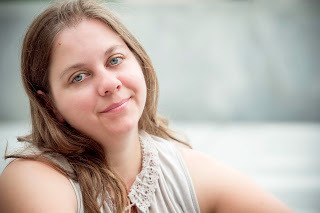 My friend Precarious Yates has released Book 1 in The Heart of the Caveat Whale trilogy. Today and tomorrow (July 5 and 6, 2012) it will be a free download for the Amazon Kindle. Congrats, Precarious! Please enjoy this guest post from her, explaining why she set her new fantasy trilogy in her most-feared environment: the Ocean.
My friend Precarious Yates has released Book 1 in The Heart of the Caveat Whale trilogy. Today and tomorrow (July 5 and 6, 2012) it will be a free download for the Amazon Kindle. Congrats, Precarious! Please enjoy this guest post from her, explaining why she set her new fantasy trilogy in her most-feared environment: the Ocean.
From Fear to Love
When I was a child I was terrified of being under water. Fear would swallow me the moment I was submerged and would last until I was safely back home again. At times, the fear was so strong I couldn’t even look at pictures of underwater landscapes, and if there was any program about fish or, God forbid, sharks, I would close my eyes and hum until the underwater scene was over.
So what was I thinking writing an epic fantasy based on an underwater world?
Slowly, as I began to write this book and research coral reefs, dolphins, squid, barnacle, tuna, sharks, and even the way bodies would move under water, I became less and less afraid. When I could, I would go swimming to do some firsthand research. And in the midst of facing this most paralyzing fear, I began to really like the water, especially the ocean.
As I faced my fear, and as I researched and wrote, I began to fall in love with the ocean. These days, I enjoy a documentary about sharks. No more closing my eyes and humming ;).
And all the while, as I journeyed from fear to love, the Lord was doing something in my heart. My fear of people dissipated. My fear of heights began to crumble. My fear of the dark was swallowed by His most marvelous light.
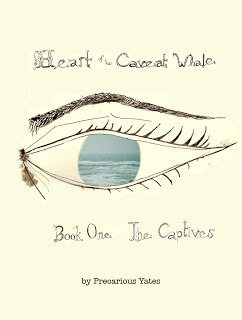 When He said, through the Apostle John (1 John 4:19) that perfect love casts out fear, He wasn’t even remotely kidding. Every step toward courage was one that I took with the Lord, laying my heart and my fears bare before Him. It was His perfect love that drove out each one of my fears.
When He said, through the Apostle John (1 John 4:19) that perfect love casts out fear, He wasn’t even remotely kidding. Every step toward courage was one that I took with the Lord, laying my heart and my fears bare before Him. It was His perfect love that drove out each one of my fears.Also, I considered this: the fear of the Lord is the beginning of wisdom. He was the one who created the oceans, and mightier than any crashing wave, the Lord on high is mighty (Psalm 93:4). God is so big that the oceans are tiny droplets in comparison. And God loves me, what do I have to fear?
I invite you to come investigate this underwater world I created. Today, the e-book The Captives, book 1 in The Heart of the Caveat Whale trilogy, is free for the Kindle. Dive in! http://www.amazon.com/Captives-Heart-Caveat-Whale-ebook/dp/B008GNOSGU/ref=la_B006ETUJE8_1_3?ie=UTF8&qid=1341410839&sr=1-3
June 20, 2012
Wicked Wildfire Readathon
 Stephen King once said that, "If you don't have time to read, you don't have the time (or the tools) to write. Simple as that."
Stephen King once said that, "If you don't have time to read, you don't have the time (or the tools) to write. Simple as that." Below, I will update the books I have read during the WWRaT, June 20 - 24. Join me in reading as much as you want of whatever you want!
Day 1: June 20
It's 10 p.m. MST, midnight EST, time to start reading. I think I'll start with Facebook friend Joana James' Alana & Alyssa's Secret:Rise From The Ashes
11:30: Just finished A&A. Good story, Definitely not bed-time reading for my 5-year-old, though. One scene in the book would give the movie an R rating.
Next book: The Vampire Handbook and Other Useful Rules and Regulations for Adapting to the Immortal Lifestyle by P.J. Jones ... Yes, I know, my Kindle collection is extremely eclectic. I love me my indie author Facebook friends. :-)
8:45 a.m. MST: Just entered my first WWRaT contest.
Rebecca at KindleFever posed this challenge:
“A wildfire is quickly coming your way! What thing/s do you grab when you only have a few minutes to make it out?”
(I’ve saved any people or pets in there already!) My answer:
After kids, husband, and pets of course, and some food and water, that won’t leave a lot of room in the car–we have a dog, three cats, five fish, a hamster, and 10 chickens. Next on the list would be the Kindle and the laptop–or at least the USB stick with all my WIP files–so I wouldn’t lose any of the books I’m working on… and so I could be able to update my blog. Then if I still had time, I’d see how many of my son’s library books I could grab. I’ll definitely need to borrow books from the library after returning home and starting over. :-)
Day 2: June 21
Well, the longest day of the year is now over. The days will begin growing shorter, but the weather will be getting hotter... interesting how that happens. No matter, any weather's good reading weather.
Finished The Vampire Handbook. A must read for anyone who cannot stand sparkly vampires and neutered werewolves. Started reading Marianne Slot's Viking's Blood series. Book 1: The Assault. It's an interesting read. I've always been a fan of historical fiction, but have never really been a fan of telling a story from the present point of view (this one is omniscient present voice). Well, off to read....



